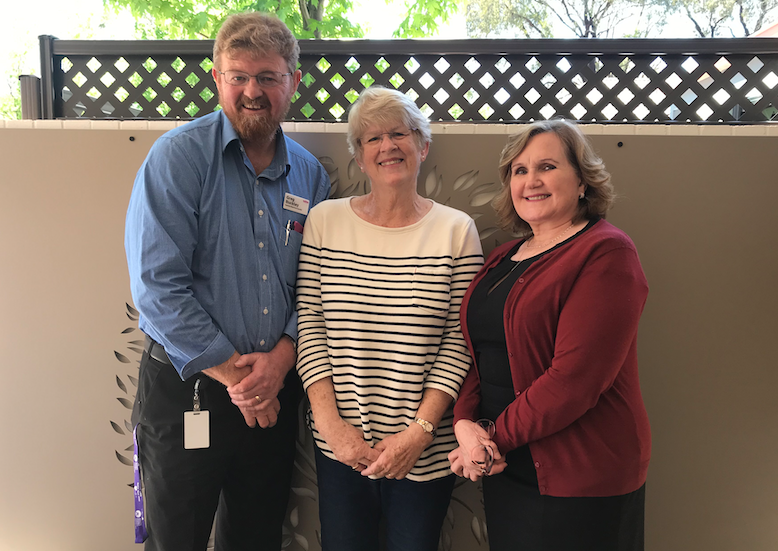
JANE Allen’s husband Nicho was diagnosed with dementia two years ago and became increasingly aggressive as his condition progressed.
However, a specialist program at Uniting Eabrai aged care home in Weston is helping to support the couple.
The Specialist Dementia Care Program (SDCP), which opened in July, offers tailored care to people living with severe behavioural symptoms of dementia, in a dedicated dementia-friendly environment, says Georgene McNeil, dementia and behaviour management practice lead (NSW & ACT).
“Only around seven per cent of people who have dementia exhibit behaviours, but when they do, they need an environment that allows for the behaviour to express itself in a way that doesn’t require pharmacological intervention,” she says.
Georgene says goals are set for residents to assist them in transitioning out of the unit within 12 months, to a less intensive care setting.
There are 10 facilities around the country running the program, which Uniting Eabrai opened in July. She says Eabrai’s program is full, and there’s a waiting list.
Before moving to Eabrai in late October, Jane says Nicho’s severe behaviour had attracted several police interventions at home, and while his only option was a care facility, it became clear that the one he’d been placed in wasn’t working for him.
“His negative behaviours were getting worse, and with some female residents quite small and frail, it wasn’t a good scenario and he ended up requiring sedation,” she says.
Once he was discharged from hospital on the right dose of medication, Jane says he was unable to go back to the care home but he was also deemed unsafe, so he couldn’t go home.
Moving to the SCDP at Uniting Eabrai has made a big difference, she says.
“Nicho had settled in within a week, and it was down to the way the team there treated him,” she says.
“He now lets someone shower him, and is mainly eating and drinking on his own. I can see the dementia is getting worse, but the behaviours are not coming back to the extent they were. I’m the most relieved I’ve felt in months.”
Georgene likens the experience of dementia to being suddenly lost in a foreign country where you can’t speak the language or understand how to behave.
“The current view is that it’s an acquired disability and a major neurocognitive disorder, diminishing intellect and cognition, so the person’s ability to think, plan, act and do is affected,” she says.
“People in Eabrai may experience breakdown, psychosis, depression, aggression and disinhibition. It’s not their choice to behave in an agitated way. It’s because of what’s happening in the brain.”
The program’s senior nurse Greg Buckley says the centre’s success starts with its calm atmosphere and homely environment, in which the residents can flourish – from setting their own routines, choosing when they want to wake and sleep, the activities they want to do and the meals they enjoy.
“Instead of forcing people into a routine and structure that works for the service they’re living in, we aim to support their rhythm of life,” he says.
“It allows the person to be who they are now, with dementia.
“We don’t challenge them; we give them things they can and want to do. We meet them where they are, and allow them to feel safe to express behaviours that might be inappropriate in a different setting. We’re setting them up to succeed.”
Georgene says the SDCP has been designed to stabilise and reduce severe behaviour symptoms over time, and is working to generate evidence on best-practice care for people living with dementia.
“Tantamount to this program is the perspective that any severe behaviour is viewed as the person responding to their environment and the people in it,” she says.
“We’re open and transparent, and my experience has been that the incredible people involved in the program work tirelessly to look after older people with dementia, and treat them as they deserve to be treated.”
For Jane and Nicho, who only married six years ago, the program has already been life-changing.
“It’s such a comfort knowing that he’s started to accomplish things again,” she says.
“The past few years have been traumatic for me in terms of grief. When we first decided to get married, Nicho told me: ‘Whatever we’ve got, we’ve got, and let’s make the most of it’. I’m grateful for the years we’ve had.”
With eight male residents in the program, Greg says he sees similar stories from their families, which has led to a plan to create a family wellness and support program.
“The partners can feel alone in this, but we can help families feel a sense of belonging, where they can connect and support one another,” he says.
Who can be trusted?
In a world of spin and confusion, there’s never been a more important time to support independent journalism in Canberra.
If you trust our work online and want to enforce the power of independent voices, I invite you to make a small contribution.
Every dollar of support is invested back into our journalism to help keep citynews.com.au strong and free.
Thank you,
Ian Meikle, editor




Leave a Reply